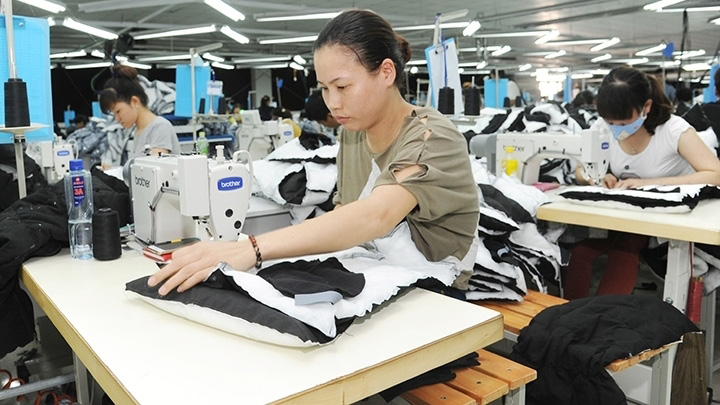
Exports have continued to be a spotlight in the economic picture this year. However, it requires sound strategies from enterprises and State management agencies to make Vietnamese exports closely connected to global value chains and have higher added values towards sustainable export growth.

A sewing factory of Bac Giang Garment JSC in Bac Giang city (Photo: Tran
Giang)
Economists said that 2017 marked the first year that Vietnam's
export revenue hit US$214 billion and the export revenue in 2018 is anticipated
to remain high due to the implementation of international economic commitments
which will help to reduce export taxes.
In addition, the efforts of the
Government, ministries and localities to reform administrative procedures and
create a favourable business environment will also contribute to facilitating
domestic production and business activities, thus, creating momentum for
exports.
However, Vietnam is still encountering a
number of problems, causing difficulties to export activities. Economist Pham
Chi Lan said that Vietnam has successfully integrated into many global value
chains, but has mainly engaged in industrial production activities in the final
stage with low added value and weak links between domestic enterprises.
In particular, Vietnamese imports and
exports mainly depend on FDI enterprises (accounting for over 70% of total
import-export turnover), while the participation of domestic enterprises in
import-export activities remains insignificant with a lack of qualified
enterprises to join value chains.
There are currently approximately 300
enterprises qualified enough to take part in the supply chain, but they remain
at the level of providing spare parts, including 2% of large enterprises, 2%-5%
of medium enterprises, and the rest are small or micro-sized.
The problems of Vietnamese enterprises also include a lack of working and
management skills and technology innovations, in addition to difficulties in
accessing finance, making the production process of Vietnamese enterprises
unrelated to value chains. Moreover, the FDI's spill-over effect on domestic
firms remains negligible. Vietnam also lacks policies and infrastructure in
support of the connection between FDI and domestic sectors.
Vietnam has to make its choice between
continuing exports, with the focus on outwork and assembly with low added
values, and diversifying itself to join global value chains to gain higher
added value.
According to experts, in order to
increase the product value chain for sustainable export growth, Vietnam must
develop a comprehensive reform package concerning specific sectors, which must
be implemented under a comprehensive roadmap. In addition, enterprises need to
enhance their flexibility and ability to grasp market opportunities, while
actively improving their skills and management capacity toward higher
productivity and effective innovations.
Deputy Head of the Department of Export
and Import under the Ministry of Industry and Trade, Tran Thanh Hai, said that
there should be more comprehensive solutions toward sustainable exports
including promoting production, creating high quality sources of input for
exports, enhancing the added value of products, while continuing negotiations
on opening markets and strengthening measures to maintain stable export
markets.
Hai noted that it is also necessary to
complete the legal framework on export activities and build appropriate product
chains to increase values for export goods.
In order to create a legal framework for
sustainable export, the Prime Minister approved the project on enhancing the
competitiveness of Vietnamese export commodities by 2020, with a vision to
2030. One of the main solutions outlined in the project is to re-organise
domestic production through the transformation of production and export
methods.
The solutions will only be effective if domestic
enterprises actively develop their own solutions to improve their
competitiveness and corporate management to stand ready to join the global
playground as partners of large corporations across the world.
Source: NDO
After more than four years of implementing a project launched by the Hoa Binh Party Committee’s Standing Board on developing agriculture and promoting product consumption linked with building new-style rural areas for the 2021-2025 period, the province’s industry and trade sector has made significant strides, greatly contributing to local socio-economic development.
Luong Son district has identified 2025 as the year for the accelerated breakthrough to successfully implement the socio-economic development plan for the 5-year period from 2021 to 2025. The district has been focusing on executing the plans and trying to achieve a GRDP growth rate of approximately 15%.
Since the beginning of this year, under the direction of the Department of Agriculture and Environment, the Sub-Department of Agricultural, Forestry, and Fishery Product Quality Management has strengthened the integration of the professional activities to promote and guide the organizations and individuals in the production and trading of agricultural, forestry, and fishery products to comply with the legal regulations regarding the use of chemicals, pesticides and veterinary medicines in crop cultivation, livestock farming and aquaculture. They also provide guidance to processing and manufacturing establishments on keeping the records to trace the product origins and using food additives from the approved list according to the regulations.
Hoa Binh province saw a significant rise in state budget revenue in the first two months of 2025, heard a meeting chaired by Vice Chairman of the provincial People’s Committee Quach Tat Liem.
Ha Thi Ha Chi, a 26-year-old graduate in law, has taken an unconventional path by returning to her hometown in Mai Chau district to establish the Tong Dau Cooperative, creating stable jobs for local women and bringing Thai ethnic brocade weaving to the global market.
As the Lunar New Year 2025 approached, pork prices surged, creating a profitable season for farmers in Tan Vinh commune, Luong Son district. Taking advantage of the rising demand, Can Minh Son, a farmer from Coi hamlet, sold over 30 pigs at 69,000 VND/kg, each weighing more than 100 kg. After deducting expenses, his family earned a profit of over 50 million VND.



